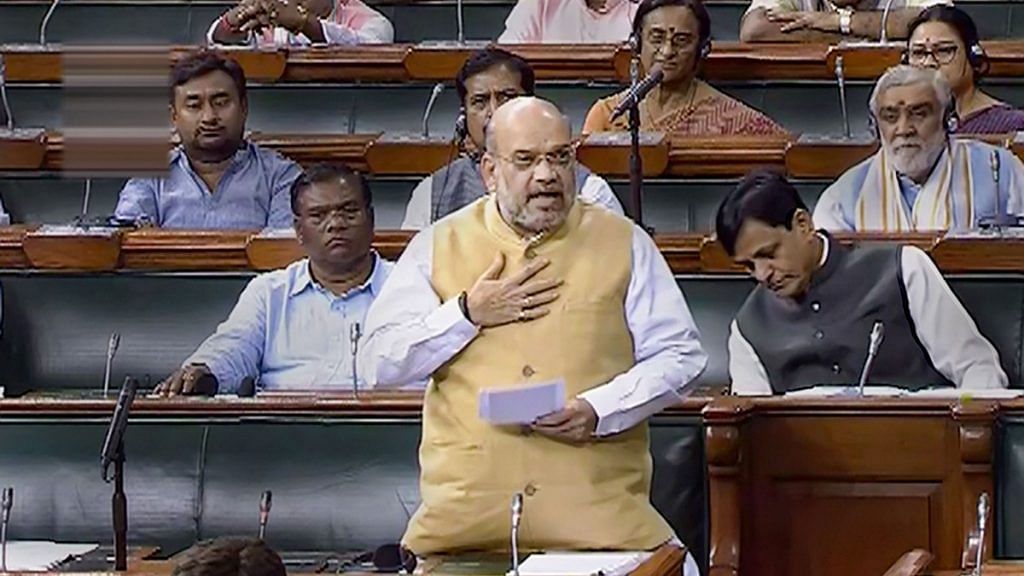The new amendments to the Unlawful Activities Prevention Act in Parliament wasn’t without opposition, even though Home Minister Amit Shah put up a strong defence. But it would be a travesty to project the passing of this amendment merely as a tussle between a weak opposition and a strong ruling party.
Not only was the Congress party’s deliberate and selective amnesia on display, but more importantly, it once again missed the opportunity to show that it can play a greater role in national integration and the fight against terrorism like the Bharatiya Janata Party (BJP). There will always be Left-oriented fringe elements prodding the Congress party to pick up a fight against the BJP. Such a stand will take the 134-year-old party to further disintegration and oblivion.
Opposition’s baseless charges
The opposition has called the amendment bill “draconian” but the Modi government’s contention holds water. A quick analysis of the nature of terror attacks and the methods used will reveal the changing nature of these dastardly incidents. The world has witnessed a rise in what is now commonly referred to as ‘lone wolf’ attack – one that is carried out by an individual motivated by radical ideology or extremist views. India’s former home minister (and now defence minister) Rajnath Singh had last year referred to the ‘do it yourself’ and ‘lone wolf’ “kind of terror attacks (as) a major challenge for us (the government) and for security agencies”.
Moreover, opposition members like Mahua Moitra questioned the amendment’s rationale without really doing any homework. Set up in 1961 by the first Prime Minister of India, It was the National Integration Council, set up in 1962, which had unanimously recommended enacting a strong law aimed at effectively preventing activities considered unlawful and detrimental to the unity, integrity, and sovereignty of the country. Laws to curb violence against SC/ST and women and minorities were recommended but terrorism did not find a place in this list as it was not as much a threat then as it is today.
Also read: Individuals & ‘urban Maoists’ terrorists under UAPA: Will it unleash new witch hunt?
Also, the Constitution (Sixteenth Amendment) Act, 1963, which was passed by both Houses of Parliament in 1967 during the Congress’ reign under former Prime Minister Indira Gandhi, had imposed heavy restrictions on freedom of speech and expression, right to assembly, and even the fundamental right to form associations or unions. Strangely, the opposition had protested then but was unable to prevent the passage of the Bill, which was considered an attack on citizens’ democratic rights.
Little wonder then that Home Minister Amit Shah read out the riot act to the protesting Congress members in Parliament and reminded them that it was their own towering leader who had first brought this ‘draconian’ law.
The opposition’s another charge – that the amendments are against the federal structure of India – also falls flat as some non-BJP state governments (for instance, in Chhattisgarh) favour a strong law to tackle the Naxal-Maoist menace, which affects economic growth and development, and challenges the authority of the duly elected state government. Even after more than 70 years of Independence, there are areas in the Naxal-affected districts where the writ of the government does not run.
Salwa Judum, the anti-Naxal movement that mobilised local tribal youth was the brainchild of a Congress member, Mahendra Karma, who started it in 2005. The movement was put to best use by the BJP government under former chief minister Raman Singh. Ironically, it was individual Naxal sympathisers, often categorised as “urban Maoists”, who got the outfit banned by the Supreme Court Court and weakened the movement. The Naxalite operators regrouped and in 2013 mounted a fatal attack on Mahendra Karma and other members of the Congress party in Darbha Valley near Raipur, Chhattisgarh.
Also read: Amit Shah assures law will not be ‘misused’ as Lok Sabha passes anti-terror bill
Amit Shah echoes majority view
The home minister’s resolve echoes the sentiments of the majority of the people who want a safe and secure environment in society. “The only purpose of this law is to root out terrorism”, Amit Shah told the House, which ideally should have been welcomed by the opposition.
The only issues where the government needs to heed to the opposition are matters concerning the misuse of the amended provisions and speedy judicial decisions. The amended law does put unrestricted powers in the hands of the police and other law enforcing agencies. Many times, these agencies not only lack coordination but may even end up working against each other. The dangers of turf rivalry should not be allowed to influence the decisions of the government while it is trying to maintain law and order.
Corruption in some of the arms of executive and a section of the judiciary is not unknown to the government or the political parties. Often times, one or two corrupt individuals can bring disrepute to the entire organisation or the government.
The home minister needs to assure the country that strictest possible action will be taken to root out terrorism and terror modules – either organised or driven by an individual. Amit Shah also needs to drive home the belief that no provision of the amended UAPA bill will ever be allowed to be misused either by those working under him or by any other ministry.
The author is the former editor of ‘Organiser’. Views are personal.
